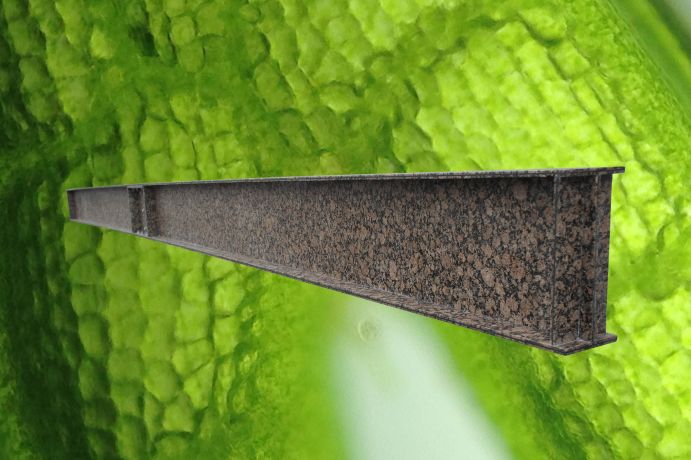DACCUSS-Pre – Building materials made of CO2-based carbon fiber and CO2-absorbing rock for the use and storage of permanently sequestered carbon
The DACCUSS-Pre project investigates the absorption and fixation of carbon dioxide (CO2) in a novel lightweight material made of hard rock, carbon fibers and biochar for permanent carbon storage.

The construction industry currently generates more than ten percent of all man-made (anthropogenic) CO2 emissions. The development of novel, low-carbon building materials can help reduce CO2 emissions from the construction sector. If carbon dioxide can be actively removed from the atmosphere and used to develop new building materials that last for a long time, this CO2 removal may even result in negative emissions.
The DACCUSS-Pre (Direct Air Carbon Capture, Utilization and Safe Storage) project is investigating the long-term storage of biologically bound carbon from the air in a new composite material made of carbon fibers (C-fibers) and hard rock. The aim of the project is to develop a prefabricated element of a house wall made of this material (carbon fiber stone, CFS®). Subsequently, it will be evaluated – also in comparison with conventional steel-concrete construction methods – whether serial production of these building elements is technically feasible and competitive. It is also particularly important to quantify the potential CO2 sink of the prefabricated house wall element made of the CFS® material compared to the steel-concrete construction method.
The initial assumption is that the overall CO2 balance of the prefabricated house wall element made of CFS® material should be negative, in other words, it should bind more carbon dioxide than is generated by its manufacture. In this project, a comprehensive analysis of all processes is to test this hypothesis.
The prefabricated house wall element made of CFS® material consists of plant carbon fibers, hard rock and an insulation layer. The carbon fibers can be produced from algae, for example, and have the same mechanical characteristics as previously used polyacrylonitrile (PAN) fibers produced from fossil raw materials. The hard rock offers additional CO2 absorption potential: during the manufacture of the stone slabs, the weathering of the rock is accelerated so that chemical reactions bind CO2 from the atmosphere in the rock. Biochar is used for the insulation layer between the stone slabs.
Partners in the project are the German Institutes for Textile and Fiber Research (DITF), the Labor für Stahl- und Leichtmetallbau GmbH, TechnoCarbonTechnologies GbR, the Institute of Geology at the University of Hamburg, AHP GmbH & Co. KG and the Institute for Future Fuels of the German Aerospace Center.
Project management
Dr. Erik Frank
Deutsche Institute für Textil- und Faserforschung
Körschtalstraße 26
D-73770 Denkendorf, Germany
Phone: +49 711 93 40 133
Email: erik.frank@ditf.de
Last updated on



